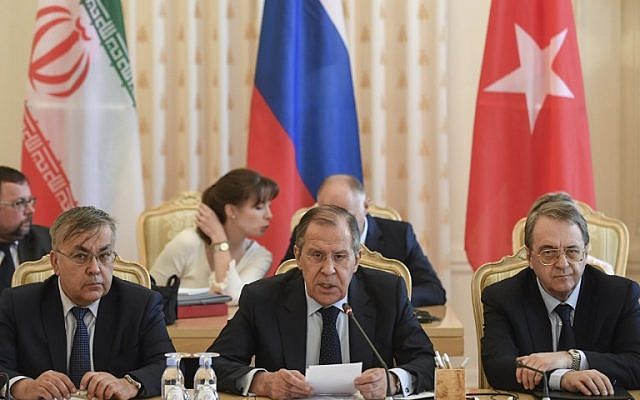Three criminal countries meeting ,,,Russia, Turkey, Iran hold talks on Syria situation
The three nations have been attempting to find a political solution to the civil war raging between Assad loyalists and rebel groups.
MOSCOW, Russia (AFP) — Russian Foreign Minister Sergei Lavrov on Saturday hosted his Iranian and Turkey counterparts for talks on Syria in the wake of an alleged chemical attack that has exposed differences between the three powers.
The three nations have been attempting to find a political solution to the Syrian conflict at talks that started last year in Astana, Kazakhstan, in competition with the US and UN-backed Geneva initiative.
Foreign Minister Lavrov held separate bilateral talks with his Turkish counterpart Mevlut Cavusoglu and then Iran’s Mohammad Javad Zarif, who stressed the warmth of their relationship in opening comments. These were to be followed by three-sided talks.
 Meeting his Turkish counterpart, the Russian diplomat stressed the “great importance” both Russian President Vladimir Putin and President Recep Tayyip Erdogan attach to improving relations.
Meeting his Turkish counterpart, the Russian diplomat stressed the “great importance” both Russian President Vladimir Putin and President Recep Tayyip Erdogan attach to improving relations.
Russian Foreign Minister Sergei Lavrov speaks during a meeting with his Turkish and Iranian counterparts in Moscow on April 28, 2018 (AFP / Alexander Nemenov)
Cavusoglu, in translated comments, praised the “atmosphere of trust that has grown up between us” and said the countries had “seriously moved forward on questions of Syria settlement.” He said Saturday’s meeting would discuss “what further steps can be taken.”
Lavrov also held a bilateral meeting with Iran’s Zarif, who hailed the three countries’ work together in the Astana process as a success, saying it led to “the defeat of the Islamic State group.”
Zarif said this was the only aspect of joint cooperation with “our Turkish friends” and it was “bearing fruit.”
Yet the latest talks in Moscow between two of Assad’s key supporters, Moscow and Tehran, and rebel-backer Ankara come as the alleged chemical attack in the Syrian town of Douma on April 7 has prompted sharply differing responses from Turkey and Russia.
“I curse those who carried out this massacre,” Erdogan said, adding that he welcomed Western air strikes in retaliation as “appropriate”.
Meanwhile Russia says the attack was staged to discredit its ally President Bashar-al Assad and this week brought a group of Syrians to the global chemical arms watchdog to back its claims.
French President Emmanuel Macron this month suggested the air strikes had driven a wedge between Ankara and Moscow as they have been building increasingly close ties.
This prompted an angry denial from Cavusoglu, who said the countries’ relations “are not so weak that the French president can break them”.
Alexander Shumilin, a Middle East expert at the Institute for US and Canadian Studies in Moscow, however, said Douma fallout had “caused a crack in the alliance of three countries”.
He added: “If the trio falls apart entirely, the ensuing events could be really bad.”
Alexey Malashenko, a specialist in the Syria conflict, was sceptical the meeting would achieve much beyond a show of unity, saying the trio have a “very shaky” alliance.
Their positions on the suspected chemical attack are irreconcilable, he said.
“Turkey has an absolutely honest position: it is against Bashar Assad and here there’s no way they can reach an agreement.”
Nevertheless, the limited nature of US-led strikes suggests the “peak of tensions has passed”, he said.
The most recent Syria talks attended by the foreign ministers in Astana were held on March 16. The next are set for May 14.
EU diplomatic chief Federica Mogherini on Tuesday urged the three powers to do more, saying they “have not only a responsibility but also an interest in making the ceasefire work”.
Eight rounds of talks under United Nations auspices in Geneva have made little headway, with Assad’s government taking little interest.
Both Tehran and Moscow have deployed military forces to Syria to back up Assad in his now seven-year-old war against anti-government rebels.
Ankara has called for Assad’s removal throughout the war, but has worked increasingly closely with Moscow and Tehran in recent months in an attempt to find a solution to the conflict.
In January, Russia held a showpiece conference in the Black Sea resort of Sochi with largely pro-regime delegates, which saw boycotts by rebels and made little progress.
Putin hosted a summit on Syria with the Iranian and Turkish presidents in November. They then met again in Ankara this month.
https://www.timesofisrael.com/russia-turkey-iran-hold-talks-on-syria-situation/
























.jpg)





















































.jpg)
Inga kommentarer:
Skicka en kommentar